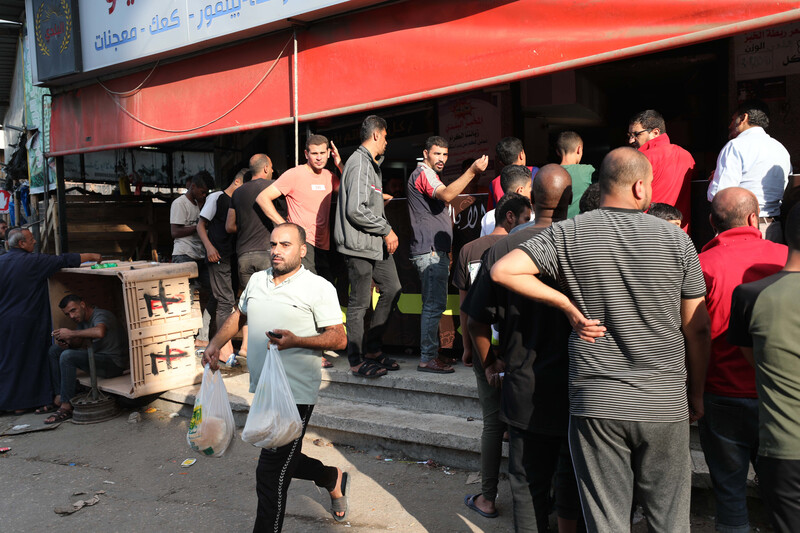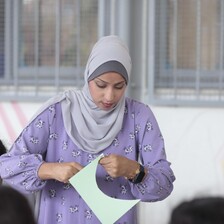The Electronic Intifada 2 November 2023

Lines at bakeries, like this one in Deir al-Balah on 16 October, are so long it can take hours to get bread.
APA imagesWhat we are experiencing here in Gaza is not a war, but a genocide.
Heavy bombs and missiles fall on civilians who should be safe in their homes. The goal is to kill entire families.
In those homes, a child rests in his father’s arms, telling him about his dreams for the future. But the sounds of bombardment worries him because he knows that these missiles that explode all through the night will kill him and end his dreams.
War is between countries that have militaries, weapons, and air forces. War is not waged against 2.3 million civilians who live in an area of 360 square km and have been under siege for more than 17 years.
We, the 2.3 million Palestinians in Gaza, try our best to live despite the siege and the scarcity of everything.
A day in Gaza passes slowly and is filled with fear and anxiety. All you want to do is stay in a safe place and follow the news. Tears never stop: tears over the scenes of death and destruction; tears over the screams of mothers and fathers. We follow the news and fear that we will be the next news item.
No one in Gaza is safe.
Despite the fact that the day is very boring and no one has the desire to do anything, we eat to be able to walk and have some energy to think about what is happening to us. Before the war, we ate three meals a day. Now, we only eat one meal a day.
Israel has cut food supplies to Gaza.
In daylight, you hear the sounds of explosions differently, depending on whether they are made by missiles from the air, the ground or from tank shells. And we wonder: What is this sound? Is it a warplane or a tank? There is no essential difference between them, of course, because both aim to kill and destroy, but we want to know that, if we are killed, by which?
Night and day
Children in the streets make the usual sounds children make while playing in the streets. They are suffocated staying in houses that are hugely overcrowded after 1 million people were forced to evacuate their own homes. They want to enjoy playing with other children. When the sounds of bombing return, they scream and look for their families. When the sounds of bombing stop, they go out again to play.
During the day, we try to meet our needs. We fill water containers and buy what food items are available in the market. Getting bread is no easy matter, as the lines at bakeries are so long, it may take seven or eight hours.
Sometimes we don’t buy from the bakery. My mother tries to make bread at home. But we don’t have gas for cooking and we cannot get any.
Israel has cut fuel supplies to Gaza.
Israel has also cut electricity supply to Gaza.
I need to charge my phone and laptop every day. I need to stay in touch with friends and family. And I need to work.
There is no electricity or alternative sources of power at home, but I live next to the European Hospital. Every day, my father goes to charge my devices. This has become a routine. If the fuel powering hospital generators runs out, there will be no charging and we will be listening to the missiles falling without knowing where or what is happening around us. And I will have to stop covering this genocide.
More anxiety starts to set in toward the evening. The bombing, whether from warplanes or tanks, escalates. My family sleeps in one room to feel safer. But there is no sleep. The sounds of bombardment never stop, and they shake the house violently. If we sleep for a few minutes, we see a nightmare of war: martyrs, children torn to shreds and white shrouds.
We wake up in fear to check on the family, to make sure they are fine.
The night in Gaza is long. Before the war, we wished the night would be long so we could rest from the day. Now we want it short. We look at the clock, perhaps night has passed and day has come, but unfortunately no.
Time passes slowly. We fear the bombs will hit us at any moment. We sit all night watching the news on our phones, even though the news is always bad. We worry if we leave the phone for a single moment.
The long hours of the night are the story of the genocide in Gaza. Thousands have been martyred and tens of thousands have been injured. In the nights, we lost many under the rubble. They are still there. There is no equipment in Gaza to pull them out.
Israel has stopped all supplies to Gaza.
We see death at night. And during the day, the world sees genocide. It does nothing to stop it.
I want to return to my home. I want to sleep a full night.
Ruwaida Amer is a journalist based in Gaza.





